|
|
|
|
|
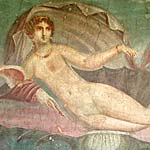
|
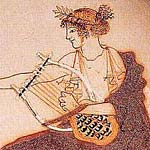
|
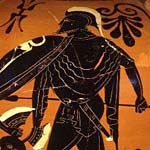
|
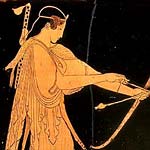
|
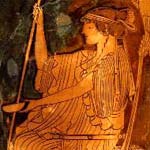
|
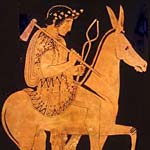
|
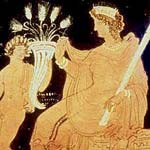
|
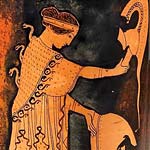
|
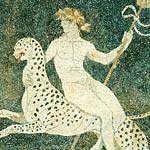
|
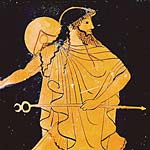
|
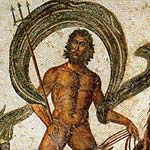
|
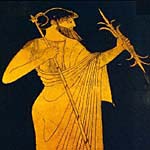
|
|
The Twelve Olympians, also known as the Dodekatheon, in Greek mythology, were the principal gods of the Greek pantheon, residing atop Mount Olympus. The Twelve Olympians gained their supremacy in the world of gods after Zeus led his siblings to victory in war with the Titans. Zeus, Hera, Poseidon, Demeter, Hestia, Hades, and Chiron(who was not a god, but a trainer to the children of the gods, also known as, demigods) were siblings. Ares, Hermes, Hephaestus, Aphrodite, Athena, Apollo, Artemis, the Charites, Heracles, Dionysus, Hebe, and Persephone were children of Zeus. Some versions of the myths state that Hephaestus was born of Hera alone, and that Aphrodite was born of Uranus' blood.
The first ancient reference of religious ceremonies for them is found in the Homeric Hymn to Hermes. The Greek cult of the Twelve Olympians can be traced to the 6th century BC Athens and probably has no precedent in the Mycenaean period. The altar to the Twelve Olympians at Athens is usually dated to the archonship of the younger Pesistratos, in 522/521 BC. The concept of the "Twelve Gods" is older than any of our Greek or Roman sources, and is likely of Anatolian origin. There seems to have been a great deal of fluidity when it came to who was counted among their number in antiquity. The classical scheme of the Twelve Olympians (the Canonical Twelve of art and poetry) comprises the following gods: Zeus, Hera, Poseidon, Demeter, Athena, Dionysus, Apollo, Artemis, Ares, Aphrodite, Hephaestus and Hermes. Hades (Roman: Pluto) was not generally included in this list. He did not have a seat in the pantheon because he spent almost all of his time in the underworld. The respective Roman scheme as given by Ennius gives the Roman equivalents of these Greek gods, but replaces Bacchus (Dionysus) with Vesta (Hestia) so as to list six gods and six goddesses. The difference in the list is explained[by whom?] by the story that when Dionysus was offered a seat among the Olympians, the total number of Olympians became thirteen. Believing this would create a fight amongst the gods, Hestia stepped down. Herodotus included in his Dodekatheon the following deities: Zeus, Hera, Poseidon, Hermes, Athena, Apollo, Alpheus, Cronus, Rhea and the Charites. Herodotus also includes Heracles as one of the Twelve. Lucian also includes Heracles and Asclepius as members of the Twelve, without explaining which two had to give way for them. At Kos, Heracles and Dionysus are added to the Twelve, and Ares and Hephaestus are left behind. However, Pindar, Apollodorus, and Herodorus disagree with this. For them Heracles is not one of the Twelve Gods, but the one who established their cult. Hebe, Helios, Eos, Selene and Persephone are other important gods and goddesses which are sometimes included in a group of twelve. Eros is often depicted alongside the other twelve, especially his mother Aphrodite, but is rarely considered one of the Olympians.Plato connected the Twelve Olympians with the twelve months, and proposed that the final month be devoted to rites in honor of Hades and the spirits of the dead, implying that he considered Hades to be one of the Twelve. Hades is phased out in later groupings due to his chthonic associations. In Phaedrus Plato aligns the Twelve with the Zodiac and would exclude Hestia from their rank. |